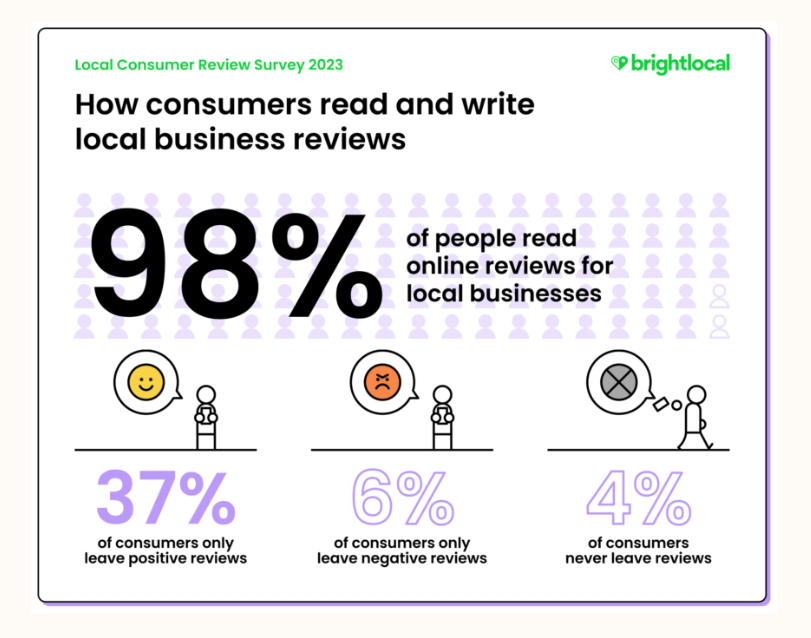Harnessing the Power of Client Reviews
In the digital age, client reviews hold immense power in shaping a company’s reputation and influencing the decisions of potential clients. Reviews, whether positive, neutral, or negative, offer insights into a company’s performance, customer satisfaction, and overall credibility. How a company responds to these reviews is equally vital, providing a glimpse into its customer-centric approach and willingness to address concerns. In this blog, we’ll explore how reviews impact business and how a company’s response to client reviews can affect potential new clients, offering guidelines for crafting effective responses across different review types.
“The single most important thing is to make people happy. If you are making people happy, as a side effect, they will be happy to open up their wallets and pay you.“
Derek Sivers, Founder CD Baby
To what extent do reviews really matter for your business?
Online reviews are now a common component of our decision-making process in the digital age. It’s almost second nature to look online for advice when searching for a new restaurant, smartphone, or service provider. Evaluations have developed into an effective instrument that can make or break companies. To what extent, though, do these reviews matter? Let’s examine online reviews in detail and see how important they are.
The Power of Social Proof
Online reviews, in essence, serve as a form of social proof. They are the modern-day equivalent of a trusted friend’s recommendation. When people share their experiences with a product or service, they are essentially vouching for its quality. The sheer volume of positive reviews significantly strengthens the social proof surrounding a business, exerting a compelling influence on potential customers’ decisions to choose one business over another. The impact of social proof extends through several facets:
- Amplifying Trust and Reliability
- Facilitating Informed Decisions
- Shaping Brand Credibility
- Informing Consumer Behaviour
- Validation through Volume

The Decision-Making Process
In the absence of physical interaction or trying out the product, reviews serve as a substitute for personal recommendations, directly impacting the decision-making process of potential clients. Reviews.io perfectly says: Customers search for much more in a review than just a five-star endorsement. On your behalf, they’re searching for genuine authenticity, openness, and involvement. In essence, they want to experience your brand through a vicarious lens before they go out on their own.
Imagine you’re planning a special dinner for your anniversary. You decide to check out restaurants online. You come across two options:
- Restaurant A has 50 reviews with an average rating of 4.7 stars, praising its exceptional service and delicious food.
- Restaurant B has 10 reviews with an average rating of 3.2 stars, with some mentioning slow service and cold food.
Which option would you pick? Probably Restaurant A. This demonstrates how reviews affect our ability to make decisions. They give us information that enables us to make wise decisions and saves us from potential disappointments.
The Impact on Trust and Credibility
Reviews are essential in determining a company’s credibility and dependability because they serve as a virtual testimonial from customers who have used the company’s goods or services. The impact goes beyond specific instances and influences how a brand is viewed in general. Trust and credibility are greatly impacted when prospective customers visit a company’s website or social media pages and come across a wide range of positive reviews. Here are some examples:
• Virtual Endorsements: Sincere testimonials from satisfied customers serve as virtual endorsements for a company. Every favourable experience that is shared strengthens the brand’s credibility.
• Developing a Positive Reputation: A company’s reputation is shaped in part by the accumulation of positive reviews. A strong reputation is an important tool for drawing in new clients and building brand trust.
• Third-Party Validation: One way to get third-party validation is through reviews. Potential clients are more likely to believe in a brand when they see that other people have not only tried but also endorsed the enterprise. This is because it offers an unbiased and independent viewpoint.
• Lowering Perceived Risk: Positive reviews considerably lower prospective customers’ perceptions of risk. It eases the anxiety of a bad experience by indicating that others have successfully negotiated the company.
• Showing Consistency: Positive reviews with a consistent rating indicate that the company keeps its word. Potential customers gain confidence from this repetition because it reassures them that their experience will probably be similar to those of those who have left positive reviews.
• Building Emotional Connection: A brand’s ability to evoke strong feelings in prospective consumers is enhanced by positive reviews. Customers are more likely to interact with and select the company because of the relatability and sense of trust that the shared positive experiences foster.
• Promoting Transparency: Transparency is demonstrated by the existence of both favourable and, occasionally, constructive reviews. Businesses that display a variety of feedback signal transparency and a dedication to growth, which builds trust in the company.
These examples highlight how positive reviews are more than just affirmations; they actively work to foster trust, cultivate a favourable reputation, and raise a company’s perceived credibility among prospective clients.
A Closer Look at Statistics
Now we can discuss in detail the value of customer reviews and how they impact your company, but first, we need some data. Let’s examine some eye-opening figures:
- According to BrightLocal’s article “Local Consumer Review Survey”, 76% of consumers regularly read online reviews for local businesses.
- NiceJob states that reviews influence 90% of potential customers better than a sales pitch
- Putting some of your reviews on your website was tested by Trustmary and these were their findings:
- An increase of 67% when website visitors were exposed to customer reviews compared to customers who did not see reviews.Service booking conversion rates increased by 29%
- A 22% increase in contact requests.

These statistics cease to be mere data points; they are clarion calls for businesses to recognize the profound and inescapable significance of reviews. In the digital age, they stand not as accessories but as imperative instruments for building trust, shaping perceptions, navigating competition, and ultimately thriving in the complex and ever-evolving business landscape.
The Influence of Negative Reviews
Even though companies might not want to hear bad reviews, they have a hidden value that goes beyond their obvious disadvantages. These critical assessments, far from being harmful, present a special chance for development and progress, framing them as helpful criticism rather than as simple setbacks.
Transforming an upset customer into a satisfied one is not only achievable but, in my opinion, considerably more straightforward than acquiring new business. Addressing their concerns effectively holds the key to this transformation. Let’s take a look at some reasons there is value embedded in negative reviews:
- As already mentioned – a springboard for improvement
- Demonstrating commitment to excellence
- Turning detractors into advocates
- Enhancing credibility
- Catalyzing continuous learning
- Building resilience in reputation management
- Encouraging honest customer feedback
The SEO Boost
Beyond the domains of customer trust and credibility, reviews have an ever-expanding impact on a business’s online visibility. In the digital sphere, where having an online presence is equivalent to being relevant, reviews become powerful tools for a company’s search engine optimization (SEO) campaign. Online reviews are a key component of search engine rankings, especially for Google, the industry giant. The volume of reviews that a company receives is a strong indicator of how likely it is to appear highly in local search results.
What are the impacts?
- Strategic SEO Significance: Online reviews are crucial for businesses’ SEO strategy, as they influence local search rankings and are considered valuable assets by Google’s algorithms.
- Direct Correlation with Rankings: A business’s higher number of reviews in local search results is seen as a signal of relevance and trustworthiness by Google.
- Visibility Amplification: Reviews enhance online visibility, as they serve as a powerful SEO tool, boosting businesses’ chances of being noticed and chosen by potential customers during local searches.
- Competitive Edge in Local Markets: Positive reviews provide a competitive edge in local markets, as businesses with numerous positive online reviews are better positioned to outperform competitors in local search results.
- Continuous Reputation Building: Businesses continuously build their online reputation through reviews, enhancing visibility and creating a positive perception, which in turn attracts more customers.
- Enhanced Click-Through Rates: Positive reviews boost local search rankings, attracting potential customers who are more likely to explore and engage with businesses with a strong online presence.
Essentially, a well-planned collection of favourable reviews strengthens a company’s online image and positions it prominently in local search results. The mutually beneficial relationship between SEO and online reviews confirms that client input plays a vital role in determining a company’s online success.
Reviews Are Priceless
So, how important are reviews for your company really? In short, there’s a lot. They are important for your online visibility, growth, credibility, and prospective clientele. Online reviews are invaluable resources in the digital age. They have the power to shape decisions made in the future; they are more than just mirror images of the past. Astute companies understand the value of reviews and take proactive measures to manage them so that they have a favourable effect on their revenue. In a world where information is readily available, reviews have taken on a pivotal role in our decision-making process.
The importance of reviews for your business goes beyond polite discourse; they are priceless resources with the ability to completely alter the digital landscape. With some mentioned previously, take a look at a few reasons why reviews are so valuable:
- Influencing Consumer Trust: Positive reviews instill confidence in a company’s credibility, fueling customer loyalty and attracting new business, a valuable commodity that reviews actively cultivate.
- Navigating Purchase Decisions: Reviews guide consumer decision-making, providing real-world insights and guiding customers towards a company, while positive reviews serve as valuable signposts in a saturated market.
- Building a Positive Online Reputation: A positive online reputation is crucial in the digital age, as it enhances visibility and solidifies a company’s standing as a trustworthy choice for potential clients.
- Driving Continuous Improvement: Customer feedback is a crucial tool for continuous improvement, driving growth, adaptability, and resilience in a company, demonstrating a commitment to customer satisfaction and fostering a culture of continuous improvement.
- Competitive Advantage in Online Searches: Positive reviews significantly enhance a company’s SEO ranking, providing a competitive advantage in online searches, and ensuring a prominent presence among potential customers.
Reviews are more than just endorsements; they are priceless tools that affect consumer confidence, direct decisions about what to buy, build an online reputation, spur development, and give businesses a competitive edge in the online market. Acknowledging the invaluable significance of reviews and proactively handling them can catapult your business toward steady expansion and prosperity in the ever-changing digital terrain.
The Impact of Responses on Potential Clients
Online reviews are now a crucial component in the decision-making process for prospective customers. Prospective buyers frequently use online review sites to assess a company’s offerings in order to learn more about the experiences of past customers. These evaluations provide insightful information about a business’s advantages, disadvantages, and—above all—its standards for providing excellent customer service. The way a business handles these reviews—whether they are favourable, neutral, or negative—can have a big impact on how prospective customers view the business.
“56% of consumers say that a business’s responses to reviews have changed their perspective on the business” – According to Podium

Positive Responses: Building Confidence and Trust
Positive reviews attest to a business’s excellence, and prospective customers notice when they are mentioned. But, a company’s response to positive reviews is just as important as the reviews themselves. The company’s dedication to customer satisfaction is reaffirmed when prospective customers see sincere, considerate, and grateful responses to positive reviews.
• Gratitude and Appreciation: Expressing sincere gratitude in response to favourable evaluations is a potent technique to instill a sense of value in prospective customers. Thanking customers not only demonstrates professionalism but also the company’s awareness of the importance of customers to its success.
• Positive Engagement: Good reactions give the impression that the business is interacting positively with its customers. Rewarding customers for their time and effort in providing feedback creates a partnership that can go a long way in building trust.
• Personalize the Response: Address the client by name and make the response personal. This adds a human touch and fosters a sense of connection.
• Highlight Key Points: Mention specific aspects of the client’s feedback that stood out. This shows that you value their input and reinforces the positive experience.
• Invite Future Engagement: Encourage the client to return or use your services again. Invite them to share their positive experience with others.
Neutral Reactions: Converting Obstacles into Possibilities
Potential customers are aware that not all reviews are positive testimonials. Reviews that are neutral and usually highlight areas in which a business can make improvements offer a chance to demonstrate openness and a readiness to address less-than-perfect experiences. Potential customers can be strongly affected by a company’s handling of neutral reviews.
• Express Appreciation: Thank the client for their feedback and for taking the time to share their thoughts.
• Transparency: Dealing with unbiased reviews in an open and honest manner demonstrates to prospective customers that the business is aware of its shortcomings. This openness has the potential to foster authenticity and trust.
• Continuous Improvement: An organization can show its dedication to continuous improvement by revealing the actions taken to address concerns raised in unbiased reviews and by acknowledging feedback. This speaks to prospective customers who value companies that strive for excellence.
• Invite Follow-up: Encourage the client to reach out directly if they have further concerns or questions. This highlights your company’s openness to resolving issues.
Negative Responses: Turning Challenges into Opportunities
A company’s true test of resilience comes when it deals with negative reviews. Prospective customers closely observe a company’s response to feedback and discontent. Quickly, sympathetically, and professionally responding to unfavourable reviews demonstrates a dedication to resolving conflicts and upholding client confidence.
• Empathetic Engagement: Acknowledging the client’s experiences and feelings in a negative review response demonstrates empathy. Prospective customers are more inclined to interact with a business that respects their feelings and issues.
• Prompt Resolution: Resolving unfavourable reviews right away conveys to customers that the business values their concerns. Prospective customers can feel secure knowing that any problems they may run into will be resolved quickly.
• Professionalism: It’s critical to remain professional when responding to criticism. Prospective customers value businesses that can take constructive feedback with grace and professionalism.
• Move the Conversation Offline: Encourage the client to reach out privately to discuss the matter further. This demonstrates your commitment to resolving the issue in a more personalized manner.
“Your most unhappy customers are your greatest source of learning.“
Bill Gates
Online reviews have been equally as important as word-of-mouth referrals in the digital age. They are relied upon by prospective customers to make knowledgeable choices about the businesses they choose to shop at. A company’s responses—positive, neutral, and negative—all influence how prospective customers view the business. Companies can gain the trust and confidence of prospective customers by implementing a thorough review management strategy that includes sincere gratitude for positive feedback, openness and a dedication to improvement for neutral reviews, and professional empathy in the face of criticism. In the end, these answers may be crucial in turning prospective clients into devoted patrons.
Mastering the influence of client reviews
The mastery of harnessing the power of client reviews is not just a strategic choice; it is an imperative for businesses navigating the complexities of the digital age. By recognizing the extent of their influence and understanding the pivotal role responses play in shaping potential client perceptions, businesses can elevate client reviews from mere feedback to transformative tools for sustained success. As the digital landscape evolves, those adept at harnessing the power of client reviews are not merely keeping pace; they are pioneering the way forward in a dynamic and ever-changing business environment.







